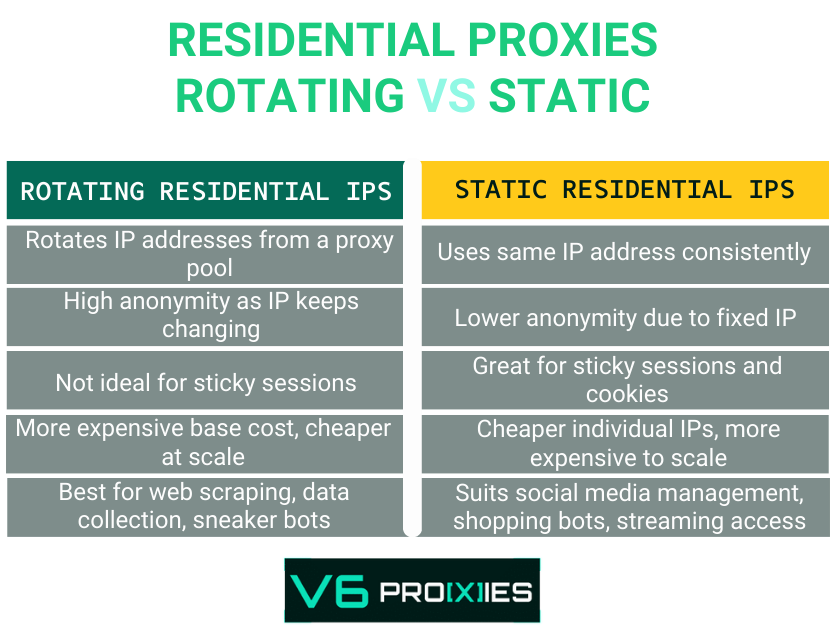Ever wondered what separates Rotating Residential Proxies from Static Residential Proxies? Or perhaps, as a proxy buyer, you’ve struggled to understand which type of proxy would serve your needs more effectively? If this rings a bell, then you’re in the right place.
This article is dedicated to offer a comprehensive analysis between rotating and static residential proxies- their features, advantages, key differentiators, and their respective applications. Whether you’re a newbie in this domain or looking for a better understanding to make a more informed choice, we’ve got you covered!
Table of Contents
A refresher
Before diving deep into the comparison, here is a quick refresher:
- Rotating Residential Proxies: These are real residential IPs, allocated by Internet Service Provider (ISP) to homeowners. These proxies rotate or change after each request or a specified time interval.
- Static Residential Proxies: Again issued by ISP, these are genuine residential IPs. However, unlike the rotating residential proxies, these proxies maintain a steady (sticky) IP address.
Now that you remember the basic concepts, let’s explore the differences between these two types of proxies more thoroughly.
Key Differences Between Rotating and Static Residential Proxies
1. IP Address Usage Approach
The essential difference between rotating and static residential proxies boils down to their approach towards IP address usage.
Rotating proxies, as the name suggests, continuously cycle through a pool of IP addresses. In other words, your identity online undergoes a makeover frequently.
On the other hand, static residential proxies maintain a consistent online persona by using the same proxy IP address over time. This steadfast approach can make some tasks significantly easier.
2. Ability To Stay Anonymous
When it comes to anonymity, rotating proxies come out on top. Why? Because they constantly fluctuate their IPs, making them harder to track. On the other hand, static IPs could be a bit of a drawback – they remain unchanged, meaning they’re comparatively more prone to be tracked and blocked.
3. Which is better for sticky sessions?
Have you ever wondered why static proxies are a popular choice for operations that require persistent sessions? The answer lies in their stability.
Unlike rotating proxies, static proxies maintain a consistent IP address and this enables them to support services like maintaining logins, keeping track of cookies, and accessing user accounts with ease.
So, if your operations heavily rely on staying logged in or tracking user behavior through cookies, static proxies could be your best bet.
4. Performance: Which type is faster?
The rotating type is indeed faster, but this statement needs more clarification.
Rotating residential proxies offer better performance for tasks that require a high level of anonymity and speed. Static residential proxies offer better performance for tasks that require a consistent identity over a long period of time. So the decision is beased on what you need them for.
5. Budget: which type is cheaper?
Static proxies are typically cheaper per IP address, with prices starting from $1 per IP address or less. However, you need to purchase multiple dedicated IP addresses to scale your operations.
Rotating proxies are priced based on the size of the IP pool and amount of traffic used. For example, plans may offer 10,000 IP addresses with 10 GB of traffic for $500 per month. While the base cost is higher, you get access to a large pool of IPs for your traffic allowance.
The total costs for static vs rotating proxies depends on your use case:
- For small scale operations like academic research, static proxies will be cheaper since you only need 1-2 IP addresses.
- For large-scale scraping operations like web scraping, rotating proxies become more cost effective as you scale traffic across a large IP pool instead of buying many individual static IPs.
- Very heavy traffic users may find rotating proxies more affordable than scaling to thousands of static IPs.
Now that you’re up to speed with the fundamental differences let’s highlight the advantages of both types in the sections below. Keep all these points in mind when deciding on the best type of residential proxy to suit your needs.
Factors to Consider When Choosing Between The Residential Proxy type
The decision to select rotating or static residential proxies mostly hinges on individual needs and some important factors you need to understand before buying.
Here are some factors to consider:
- Use Case: Your specific use cases determine the type of residential proxy you need. For example, Rotating proxies work well with web scraping or data harvesting. In contrast, static proxies are ideal for tasks requiring a consistent IP address, like managing social media accounts or buying tickets.
- Session Control: If your task requires long sessions or maintaining the same IP for a significant period, static residential proxies are your go-to. Rotating proxies might not work here as they change the IP address after every few requests.
- Website Complexity: Sites with advanced anti-bot measures are difficult for static proxies to bypass. But, rotating proxies, with their dynamic pool of IP addresses, reduce the chance of getting detected and blocked.
Now that we’ve detailed these factors, it’s up to you to weigh what’s more important in your case. As said, it’s largely subjective to your goals and the nature of your tasks.
Common Use Cases for Rotating Residential Proxies
Heavy Web Scraping
Rotating proxies are a great option for scraping large amounts of data without getting blocked as they offer a high level of anonymity.
Ecommerce Price Monitoring
Scraping thousands of product pages across retailers requires rotation and many different IPs to avoid blocks.
Sneaker Botting
Copping limited sneaker drops requires many proxies to maximize checkout chances.
Online Gaming
Rotating proxies can be a better choice for gaming than static proxies because they can help to improve ping and avoid IP bans. Static proxies can also be used for gaming, but they may be slower and more likely to be banned by game servers.
These examples shed light on the efficacy of rotating proxies in dealing with large-scale, data-intensive tasks.
Common Use Cases for Static Residential Proxies
But, what about static residential proxies? When should they be your first choice? They are the best choice when you need the same IP for different steps. Consider these cases:
Online Shopping
Static residential proxies are ideal for online shopping, particularly for purchases that require a consistent identity.
Accessing Streaming Websites
The sticky IP type is better in this case for accessing geo-restricted streaming content without risking service interruption due to IP rotation.
Social Media Management
Platforms like Facebook or Instagram may flag accounts that access services from different IPs. Static proxies provide a consistent IP, minimizing the risk of account suspension.
In conclusion, both rotating and static residential proxies serve different purposes and choose either deeply depends on the application you have in mind. Review the differences then decide and buy the best packages from V6proxies specialized solutions.
Related:
- Tags:
- Residential proxies






